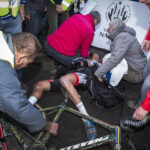Teaching bike maintenance to Indigenous youth has many benefits.
In southern Manitoba, Peter Loewen, the owner of Country Cycle, is doing more than just running a bike shop. He’s teaching bike maintenance to Indigenous youth. Using his passion for cycling he’s creating a lasting impact on Indigenous communities through a grassroots program. His journey began in 2022, with a mission to address the lack of access to quality sporting equipment in these communities.
The program is built on a simple yet powerful idea: equip kids with durable bikes and teach them the skills to maintain them. Loewen’s hands-on approach—inviting kids to repair their own bikes —has not only sparked interest but also instilled a sense of pride and ownership among participants.
A need for proper bikes
“When I visit communities, I invite the kids to bring their bikes and we spend a few days repairing them,” Loewen explains. “Most of the bikes the kids have are from department stores and weren’t made for the rough conditions on gravel roads.” Loewen brings in tools, parts, and his experience, working with the children to fix their bikes. The workshops engage kids in practical problem-solving and give them a sense of accomplishment as they see their bikes transformed from barely functional to reliable rides.
More than just bike repair
Beyond repairs, Loewen is working to introduce programs like Kids of Mud, a six-week initiative teaching proper bike handling and riding skills. “I’d love to bring something like that to Indigenous communities,” he says. But Loewen admits the challenges in adapting these programs to fit the specific needs and environments of the communities. “It’s a trial-and-error process,” he acknowledges.
In these areas, where kids face significant challenges such as obesity, mental health struggles, addiction and isolation, biking provides not just physical exercise but also a new way to build self-esteem and community. “Biking has kept me balanced throughout my life and I see it as a potential tool for these kids as well,” Loewen reflects.
Respecting traditions
Loewen’s approach is careful and considered, especially when it comes to gaining the trust of the Indigenous communities. “There’s always the concern that here comes another white guy telling them how to run their community,” he says, aware of the sensitivities involved. To bridge that gap, he partnered with Eric Mentuck, an Indigenous friend, to guide him through the cultural and practical nuances of working in these communities.
Consistency and a commitment to building relationships have been key to the program’s success. Loewen’s repeated visits to the same communities have shown the youth and elders alike that he’s serious about making a difference. “I’ve been to six communities so far, and the kids and community members recognize me now,” Loewen says.
Moments of success
There have been many small victories along the way, moments that show the potential for long-term impact. In York Landing, for instance, Loewen recalls, “there are always a few kids who really connect with what we’re doing. Some kids take charge in the bike repair workshops, helping replace brake cables or seats. It’s a small step, but it’s really encouraging.”
A young girl named Aurora, is a standout whose enthusiasm for biking has been a constant inspiration for Loewen. Kids such as her are why Loewen continues to push forward, despite the challenges of funding, logistics and community outreach.
The road ahead
The future for Loewen’s program is wide open. He’s already been asked to expand beyond biking—some communities have even inquired about leading canoe trips. But for now, he’s focused on ingraining biking culture. He’s helping kids discover the joy and freedom of riding.
“There’s so much potential,” Loewen says.
As the program gains traction, the possibilities seem endless. Loewen’s passion, combined with a deep respect for the communities he serves, is helping to carve out a new space for Indigenous youth—one that could provide them with not just a fun activity, but a new path to health, self-esteem and connection to their environment.
The post Bringing bike culture to Indigenous youth appeared first on Canadian Cycling Magazine.



